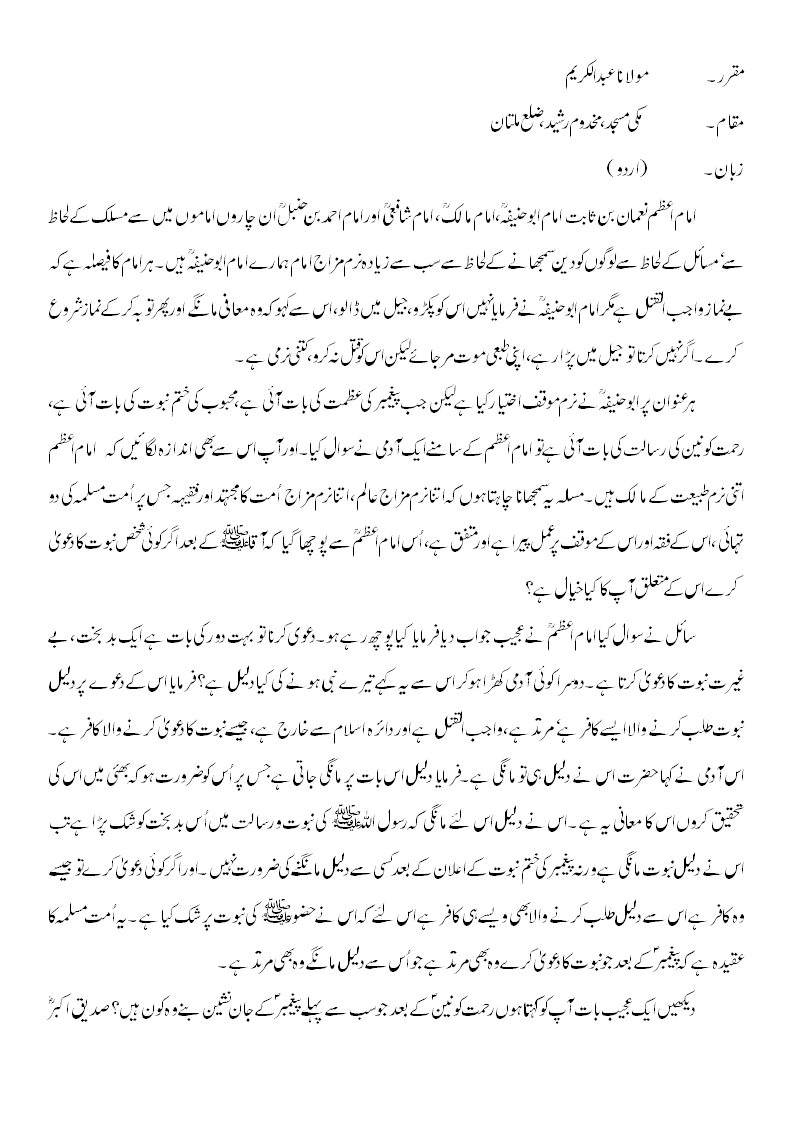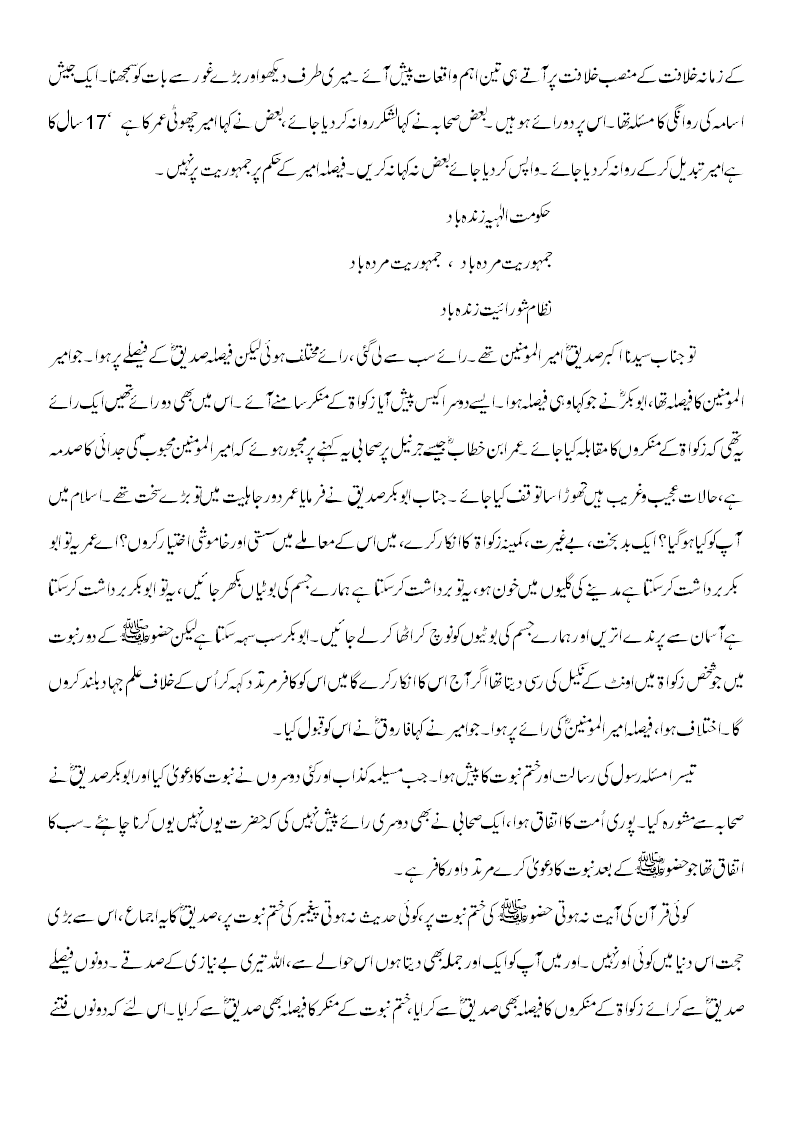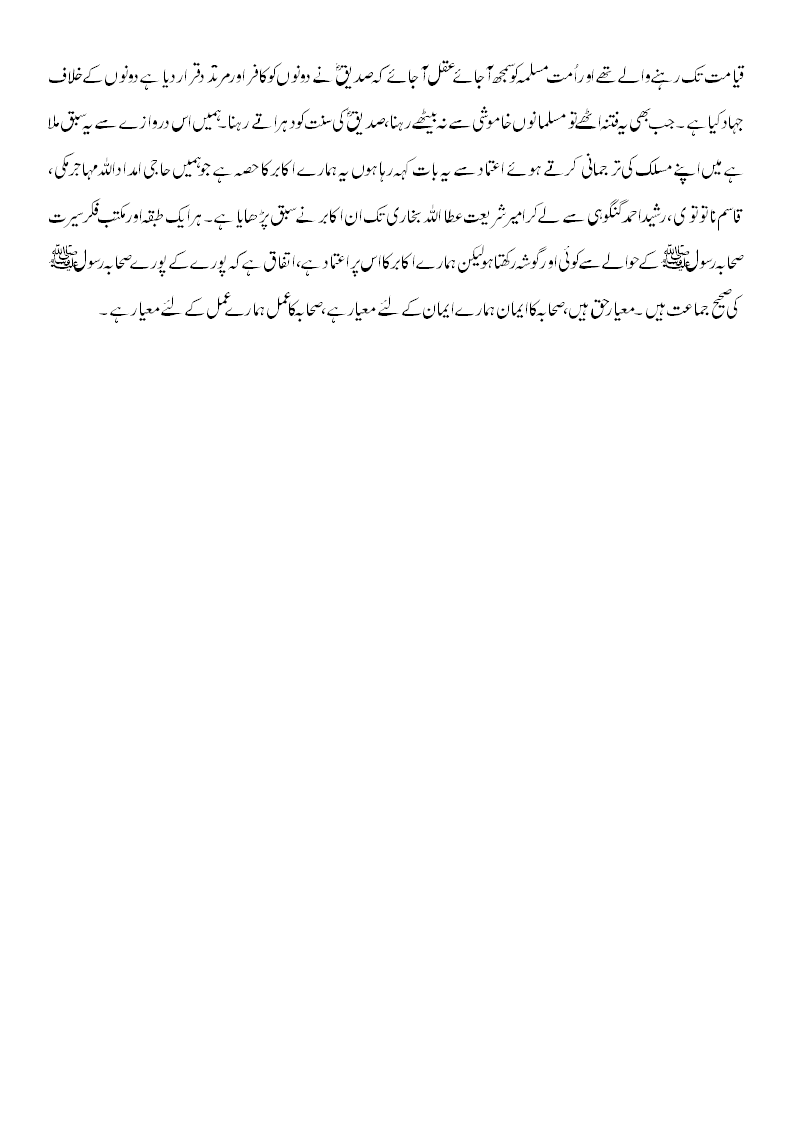Speaker: Maulana Abdul Karim
Location : Makki Masjid Makhdoom Rashid, Multan
Sect: Deobandi
Language: Urdu
[tab:Listen]
Listen to Maulana Abdul Karim by clicking at the Play button below
(To download, press right mouse click here and select ‘Save Target As’)
[tab:Read English]
Out of the great Islamic jurists – Imam Azam Numan bin Thabit Abu Hanifa, Imam Malik, Imam Shafei, Imam Ahmad bin Hanbal – the first named Imam Abu Hanifa had the softest disposition while explaining the faith to the people. Every Imam thinks that the non-observant of namaz is to be killed, but Imam Abu Hanifa said no, catch the offender and put him in jail and make him ask for forgiveness and do tauba and say the namaz. But if he does not do so let him stay in jail till he dies his natural death.
Imam Abu Hanifa was soft on the corrupt and immoral but when it came to the greatness of the Prophet PBUH he was not soft at all. Once a man asked him what would be the punishment of the man who claims prophethood, the Imam with the softest disposition and head of the 60 percent of the Muslim of Hanafi faith said:
“Not only is the pretender deserving of death but the man standing nearby asking for proof fromsuch a pretender becomes apostate and has to die too. When is proof demanded? When you are in doubt and have to remove it through proof. Who can be for a moment in doubt about the prophethood of the Prophet PBUH? After the announcement that there would be no prophet after the great Prophet PBUH there is no justification in the demand for proof from a pretender. Thus, the followers of Islam believe that not only is the one who pretends to be prophet has to die but also the man who demands proof of his being a prophet.
I will give the example of the great man and companion who became the successor-caliph after the Prophet PBUH, Hazrat Abdu Bakr Siddiq. In his times three important events took place: one was the departure of Jaish-e-Osama about which there are two views. One side said the war party should be sent while the other said the commander at 17 was too young and the war party should be sent after changing the commander. The decision was finally taken, not on the consent of the people but on the order of the leader (amir).
“The Government of Allah Zindabad! Democracy Murdabad! System of consultation Zindabad!
“Hazrat Abu Bakr took the opinion of all but the final decision was taken by Hazrat Abu Bakr himself.
“The second event was related to the collection of Zakat. Here too there were to views on what to do with those who refused to pay Zakat. Even such great men as Hazrat Umar al Khattab thought the demise of the Prophet PBUH had drowned the people in grief therefore some relief should be given. To which Hazrat Abu Bakr said, “Umar! You were strict during the times of Darkness, what has happened to you under Islam? Why should I be soft on a low and shameless person who refuses to pay Zakat? Umar, you can say that Abu Bakr will tolerate blood flowing in the streets of Madina, will tolerate that our bones be scattered and birds descend from the skies and eat our flesh, but not non-payment of Zakat. In the times of the Prophet PBUH the man who gave the nose-ring of his camel as Zakat but today if he refuses to pay I will call him apostate and will go to war against him”.
Thus after difference of opinion the final decision came from the Leader of the Believers. Whatever the Amir said, Al Farooq (Umar) obeyed.
The third matter arose in relation to the prophethood of Muhammad PBUH and his Finality. Many people like Musailma Kazzab claimed to be prophets. Hazrat Abu Bakr conferred with the Companions. All the Muslims agreed on what to do and no one had a different opinion. It was decided that any one claiming to be a prophet after the Prophet PBUH would be an apostate and a non-believer.
Had there been no verse of the Quran on the finality of the Prophethood PBUH, had there been no relevant Hadith, even then the collective opinion (ijma) under Abu Bakr would have been the most authoritative direction. Allah implemented both the commandments – Zakat and Finality of Prophethood PBUH – through Abu Bakr. Because both the mischiefs (fitna) are to remain in this world till the Last Day. Thus should the umma (nation) of Muslims understand fully the importance of the apostatisation of two kinds of deniers. So whenever these two mischiefs raise their heads, Muslims are beholden to remember the decisions made by Hazrat Abu Bakr and repeat his example. I assure you all that this is the belief of our great past leaders: Haji Imdadullah Muhajir Makki, Qasim Nanotivi, Rashid Ahmad Gangohi, and Amir Shariat Ataullah Shah Bokhari. Our ancestors believed that the Companions were the true party and remain the yardstick of truth and faith. The acts of the Companions are for us to follow.
[tab:END]



12:07 am on May 19th, 2011
jazzak’allah molana sahib
12:09 am on May 19th, 2011
is tarah k mazeed halaat.o.waqeyaat teheer karein molana sahib or imaamon k. jazzak’allah